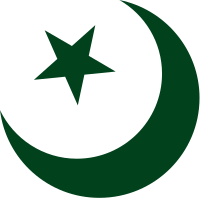Pakistani name
A Pakistani name (Urdu: پاکستانی نام) consists of a given name, sometimes a middle name, and a surname. Pakistani names vary depending upon ethnicity and spoken language.
| Part of a series on the |
| Culture of Pakistan |
|---|
 |
| Traditions |
| Cuisine |
| Sport |
|
Given names
Since the Muslim conquest of the Indus Valley, the majority of Pakistani given names are derived from Persian, Arabic and Turkish names. Children may be given one, two or rarely three names at birth. If the person has more than one given name, one of them is chosen as the person's most called name, by which he is called or referred to informally. Generally for males, Muhammad, the name of the last prophet of Islam, is chosen to be the person's first given name, if he has more than one. Because of the prevalence of this practice, this name is usually not the person's most called name, as it does not serve as a unique identifier. Ali is the 2nd most common given name for males in Pakistan. Female names tend to be more mixed and are usually given two names.
Common male given names
- Ejaz
- Eshiram
- Parvez|Pervez
Common female given names
- •Aisha •Alishah •Alishba •Amtul •Attia •Alina •Aliza •Aliha •Alima •Amna •Aminah •Areeba •Abeeha
- •Bano •Babra •Bahra •Bahrah •Beenish •Bahar •Bushra •Bushrah •Batoo
- •Chadia •Chafia
- •Deeba •Deedar •Dua •Duaa• Donya •Donyaa •Dunya •Dunyah •Dania •Danya
- •Fahmida •Fahmidah •Farida •Faridah •Frida •Fareeda •Farnaz •Farhia •Fatima •Fatimah •Fouzia •Fiza •Faiza
- •Galinah •Gabina
- •Hania •Humaira •Humayra •Hadiya •Hadia •Humaima •Humaimah •Hina •Hinah •Huma •Humah •Hafsa •Hafsah
- •Iffat • Iman •Ismat •Ishrat
- •Jannat •Jasmine
- •Komal •Kashmala •Kaukab •Kousar •Khurshid .khadijah. khadeejah
- •Leila •Laila •Lubna •Laiba
- •Madeeha •Madiha •Maheen •Mahira •Mahnoor •Malala • Maria •Mariah •Maryam •Mariam •Marwa •Marwah •Meesha •Meeshah • Mehreen •Mehwish •Mina •Mena •Mithra •Mithrah •Madina •Madinah •Musarrat •Maha
- •Nabila •Nadeema •Namra •Nasreen •Nazanin •Nadia •Neha •Niloufar •Nilofar •Nusrat •Nuzhat •Noor •Nuwabibi
- •Parisa •Parisa •Parveen •Parvin
- •Qirat •Qudsia
- •Reyhan •Rayyan •Rehana •Raihanna • Resham •Roshanah •Ruba •Ruksana •Ruqqyah •Ramsha
- •Rimsha • Rahma •Rabia •Razia
- •Saba •Sidra •Sadia •Sahar •Seher •Saima •Sana •Sana •Sara •Shirin •Simin •Soha •Safa •Safah •Sohelia •Saira
- •Tahmina •Tahminnah
- •Ushna •Uzma •Urooj •Urwa
- •Yasmin •Yusra
- •Zara •Zarah •Zahra •Zahrah •Zaynab •Zainab •Zeba
- •Zebah •Zohra •Zohrah •Zoya
- •Zoyah •Zimal •Zymal
Surnames
Unlike the practice in Western countries, and other countries with predominant European influence, there is no one way of writing a full name in Pakistan. The most popular convention is to append the most called given name of the father to the person's given names. Often, if the person has more than one given name, his full name consists only of his given names. Another convention is to prefix the person's given name with a title, which is usually associated with his tribal ancestry. Due to western influence, appending rather than prefixing titles to given names has become more common. One notable exception is the title Khan, common in people of Pashtun origin, which has always been appended rather than prefixed to given names. There are several titles used in Pakistan and other Muslim countries. Syed, Shaikh, Khawaja, Pasha, Mirza, Chachar etc. are common. Less commonly, the tribal name itself is appended to the person's given names. For females, tribal names or titles rarely figure in the person's full name (although this has become more common due to Western influence). Instead her full name would be composed of her given names only, or if given only one name, her given name appended with her father's most called name. After marriage, the full name would be her most called name appended with her husband's most called name. In official documents, a person's identity is established by listing both the person's full name (however they may write it), and their father's. For married women, the husband's name might be used instead of the father's. Official forms always contain fields for both names, and they are used together as A son/daughter/wife of B on ID cards, passports, diplomas, in court, etc. The problem with these naming conventions is that it is difficult to trace back family roots. Many Muslims have settled in Western world and this naming convention creates some problems as a father will have a different surname or family name from his children.
Rahis
- Abro
- Akhoond
- Arbab
- Baba
- Babu
- Baig
- Begum
- Chaudhary
- Dewan
- Effendi
- Emir
- Faujdar
- Ghalotar (Jutt)
- Ghengat
- Gardezi
- Jam
- Jarral
- Khan
- Khan Bahadur
- Khan Sahib
- Khatun
- Khattak
- Mahr
- Sharif
- Makhdoom
- Malik
- Maqsood
- Mir
- Mirza
- Mullah
- Niazi
- Nawab
- Padishah
- Qureshi
- Qanungoh Shaikh
- Rais
- Raja
- Rana
- Rawal
- Saeen
- Sahib
- Saravan
- Sardar
- Shah
- Shaikh
- Soomro
- Subahdar
- Sultan
- Sultana
- Syed
- Tumandar
- Ustad
- Vizier
- rahoo
- Vali
• Chaudhry or Choudhury
• Multani
Prefixes
- Haji, one who had made the Muslim pilgrimage to Mecca.
- Mir, generally indicates seyed and/or royal descent.
- Ghengat, used for people one of clan of rajputana ruling area presently in Sindh, bahawalpur and Rajasthan India
- Saeen, used for people who speak Sindhi
- Syed, used for people belonging to the family of Muhummad
Suffixes
- -i, a common suffix used for surnames.
- -zai, "descendant of" used commonly in Pashtun surnames.
- -nia, "His/Her highness (Title)".
- -bakhsh, "granted by".
- -dad (Middle Persian: Dāta), "given by".
Names by ethnicity
Pashtun names
Sindhi names
See also
- List of Pakistani family names
- Honorifics in Pakistan
- Arabic name
- Turkish name
- Persian name